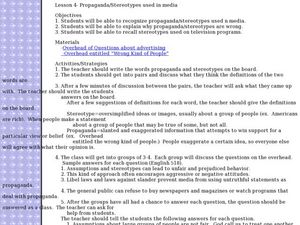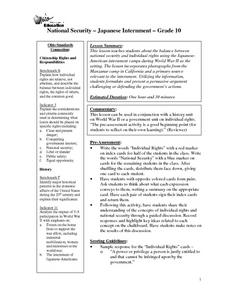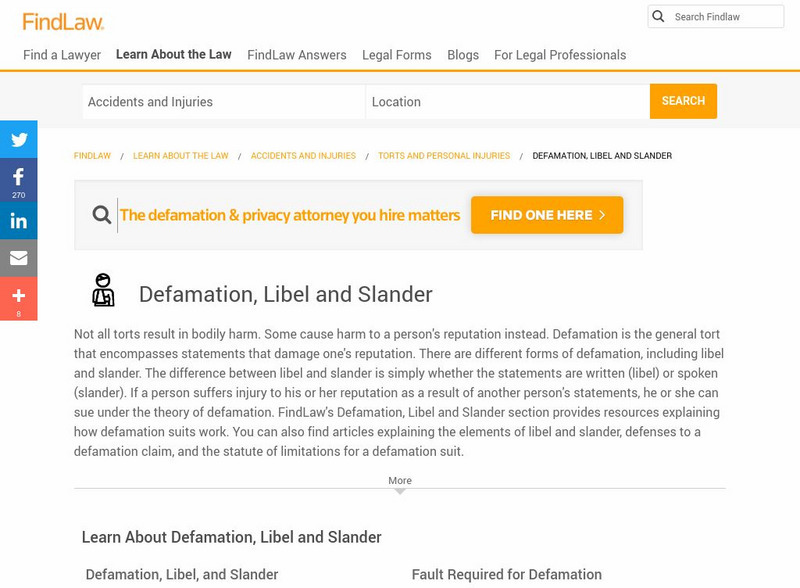Alabama Department of Archives and History
New York Times Co. v Sullivan: The Alabama Case that Changed Libel Law
Malice aforethought? Can the New York Times be held libel for false claims appearing in its ads? The Supreme Court case New York Times v Sullivan changed the interpretation of the First Amendment. Class members examine these changes and...
Curated OER
Law & Ethics for Photojournalists
Learners identify and discuss First Amendment rights, examine how to make sound legal judgements regarding photographs of private individuals, examine difference between public and private figures as far as libel law is concerned,...
Curated OER
Chaucer's "The Prioress' Tale"
Students examine Anti-Semitism in literature. In this Chaucer lesson, students review the concept of blood libel and then identify and analyze the Anti-Semitic message of "The Prioress' Tale."
Curated OER
What are the benefits of having a Free Press?
Students examine why actual malice is necessary in libel cases. Students demonstrate the importance of a third party in libel and slander cases. They analyze why a free press is essential in American society.
Curated OER
Worksheet #56 Questions - Judicial Terms
In this American judicial terms worksheet, students examine their knowledge through ten fill in the blank questions that relate to the aforementioned topic.
Curated OER
Students Press Law and Ethics
Young scholars research the rights and the responsibilities of journalists in dealing with First Amendment issues. In this First Amendment lesson plan, students research the Alien and Sedition Acts and study the five elements of libel....
Cave Creek Unified School District
Crusades and Culture in the Middle Ages
The Crusades sounds like a glamorous time period in the Middle Ages full of glory—but was it? Scholars find and review the truth of the Crusades' influence on the world through the resource. The study guides, separated individually by...
Curated OER
Researching American Democracy
Students compare Watergate and the Clinton/Lewinsky scandal. In this U.S. Constitution instructional activity, students define vocabulary terms and read articles regarding the impeachment process. Students respond to questions that...
Curated OER
Propaganda/Stereotypes Used in the Media
Students write a character sketch on a television character who they feel is a stereotype. In this propaganda/stereotype lesson plan, students discuss the definition of the terms and ways that the media uses both. Students relate the...
Curated OER
The Bill of Rights
Seventh graders determine why the Bill of Rights was added to the Constitution. In this U.S. government lesson plan, 7th graders discuss the first 10 amendments and any vocabulary they may be unfamiliar with. Students then read different...
Curated OER
Breaking News English: Anti-McDonald's McDavids Beat Goliath
In this English worksheet, students read "Anti-McDonald's McDavids Beat Goliath," and then respond to 8 multiple choice, 27 fill in the blank, 7 short answer, 20 matching, and 8 true or false questions about the selection.
Curated OER
National Security - Japanese Internment
Tenth graders investigate the balance between national security and individual rights using the Japanese American internment camps during World War II as the setting. The lesson incorporates photographs from the Manzanar camp in...
Other
Student Press Law Center Legal Brief: Libel Law
Excellent site for students that need to know more about libel laws. Includes a definition of libel, a process to go by in order to avoid a lawsuit, and your defense options if you happen to be involved in a lawsuit.
Thomson Reuters
Find Law: Defamation, Libel, and Slander
An introduction to the legal definition of defamation.
University of Missouri
Famous Trials: John Peter Zenger Trial
This is a comprehensive site from UMKC School of Law concerning the trial of John Peter Zenger. You can find just about any information you may need here, from the issues of The New York Weekly Journal to the trial record. Also of...
Other
Law School help.com: Torts: Defamation
Learn about defamation, "An invasion of the interest in reputation of a person or a group of persons resulting from libel or slander." This website provides definitions of both libel and slander, and addresses the role of defamation in...
Wikimedia
Wikipedia: Defamation
Learn what defamation is, and explore the legal differences between slander and libel. Other concepts include "false light" and "absolute privilege." Also looks at legal defenses used and defamation laws in other countries.
University of Missouri
Famous Trials: Confidential Magazine Trial (1957)
Thomas Wolfe called Confidential (1952-58) "the most scandalous scandal magazine in the history of the world." Confidential went where no publication had gone before in exposing to the public the private lives of celebrities. Truth,...
US National Archives
Docsteach: u.s. V. Amistad: A Case of Jurisdiction
Students will analyze specified passages from the Supreme Court's decision in United States v. Libellants of Schooner Amistad to explore the concept of jurisdiction and how a case travels through the federal court system.
Thomson Reuters
Find Law: u.s. Supreme Court: New York Times v. Sullivan (1964)
Provides a brief summary and the text of Chief Justice Brennan's opinion of the Supreme Court in this case involving libel.
Independence Hall Association
U.s. History: Beginnings of Revolutionary Thinking: Trial of John Peter Zenger
Freedom of the press? That was not always an accepted right. Read about the trial of John Peter Zenger, who was accused of libel for printing truths about the royal governor of New York. Find out the outcome of the trial and what it...
Other
The Louis D. Brandeis Collection: Synopsis of the Ballinger Pinchot Affair
A good summary of the Ballinger-Pinchot controversy where Richard Ballinger was accused of corruption, Collier's Magazine became involved, and Louis D. Brandeis was hired by the magazine to represent it because it was accused of libel.
US National Archives
Our Documents: The Alien and Sedition Acts (1798)
The Alien and Sedition Acts were passed by Congress in 1798 because of feared war with France. This engaging page gives you the opportunity to see a complete copy of the original document and also gives links to a typed transcript,...
Independence Hall Association
U.s. History: Alien and Sedition Acts
A great description of the Alien and Sedition Acts, passed by the Federalist Congress in 1798. See how the Federalists tried to hang on to power by restricting voting privileges and infringing on free speech and freedom of the press.
Other popular searches
- Libel Issues
- Slander and Libel
- Arnold Libel
- Arnold Libel Mouse Soup
- Libel Scenarios
- Journalism Law Libel
- Cookies by Arnold Libel
- Arnold Libel Literature Unit
- Arnold Libel Fables
- Arnold Libel the Kite
- Slander Snd Libel
- Arnold Libel the Letter
























